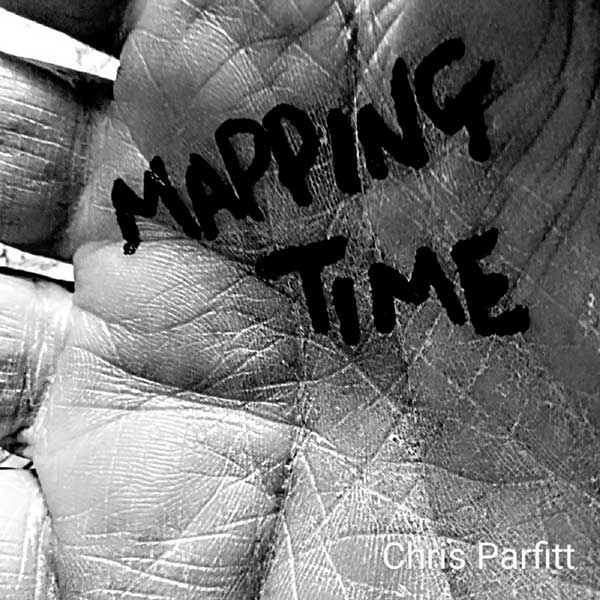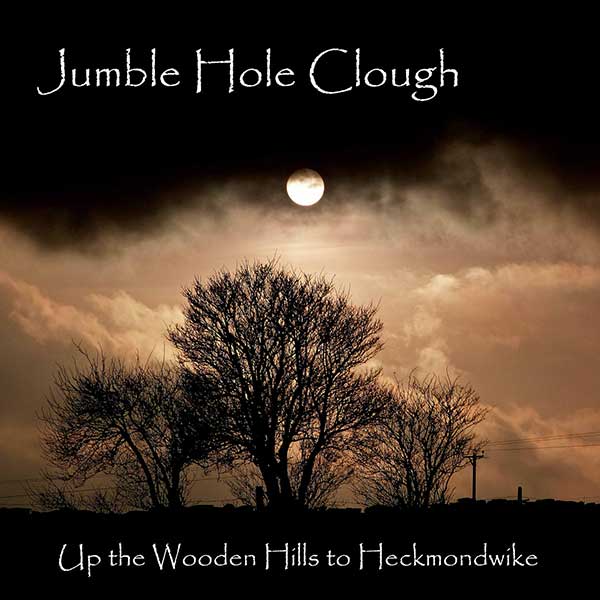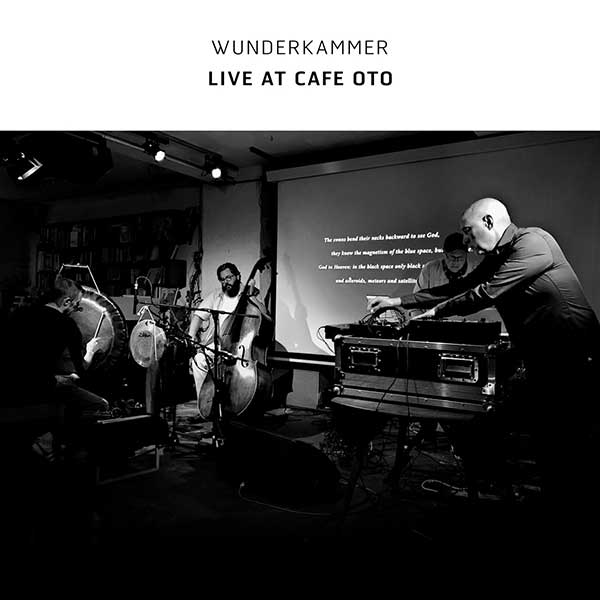Mapping Time, Noteherder (Recordiau Dukes)
Up the Wooden Hills to Heckmondwike, Jumble Hole Clough (Jumble Hole Clough)
Morning Music, Takahashi Rose (Scatter Archive)
Live at Café OTO, Wunderkammer (Confront Recordings)

Mapping Time is the latest release by Welsh multi-instrumentalist and improviser, Chris Parfitt (aka Noteherder). The gnomic album notes, though thought-provoking on the human mind and the nature of improvisation (he talks of the music as, ‘an improvisation, constructed out of false memory’ and the ‘temporary becoming liminal’), are short on specifics, but, from listening to it, I’d say Parfitt is recording duets with himself here, playing sax and either mallet instruments (vibraphone and marimba) or a keyboard using samples of the same. Either way, the results are bewitching: I’ve been playing it over and over most of this afternoon. There are four tracks and Parfitt herds his notes to particularly good effect. A lot of listeners, I think, will be drawn to the second, ‘Heart Beat’. In it, a thoughtful, inventive sax line evolves over a minimal, repeated diatonic pattern on the vibraphone: wistful, understated music that put me in mind of Harold Budd. You’ll probably find, like me, that once you start listening to this album, it’s hard to stop.
I always get up early on Saturdays to proof-read whatever it is I’m sending in for next week’s IT. I’d usually be going through it right now but the latest Jumble Hole Clough (aka Colin Robinson) album has just been released (7am) and I’m sat here listening to it. Just time to write about it and slot it in with the other albums I’ve been writing about. As Robinson said, back when he first announced he’d made it, ‘People had been asking me why all my songs were only about 2 minutes long. My standard answer was “I’ve said what needs to be said. Why say it again?” However, I’ve decided to create an album of longer pieces. So, I set out to make an album where all the songs are over 10 minutes long. And I’ve done it.’

It turns out Up the Wooden Hills to Heckmondwike is quite something. It contains some of the best music JHC has ever come up with. It’s full of sonic surprises. In an effort, I suspect, to find ways of creating extend tracks Robinson pushes the possibilities of electronics further than he usually does, to great effect. As usual, there are unnerving psychological undercurrents – at the start of the first track we hear snatches of a disembodied voice telling some anxiety-fuelled anecdote about parking a car. Most of what it says is drowned out by music and birdsong. In the second, something’s buried in the garden – I don’t think we ever find out what. The third track, ‘Standing Around in the Sitting Room’ begins with an instrumental section that captures exactly the kind of odd, disassociated feeling one might feel while standing around in a sitting room. In the fourth, the title track, Robinson at one point sings, repeatedly, ‘don’t go to sleep’. There’s no chance of that. There’s talk of Morpheus, which is appropriate, as, not only is he the god of sleep – and much of JHC’s music has always been held together by dream-logic – but, also, his name means ‘fashioner’, as in maker of shapes, from the Ancient Greek and, to go back to what Robinson said about making the album, it was, at the outset, all about finding ways to create more extended musical shapes.
Upto now, I’ve always associated Heckmondwike with the Morrison’s supermarket there. I used to shop there every week. From now on, though, I’ll always associate it with Jumble Hole Clough.

Simon Rose is a sax player and an author (of, among other things, the book, ‘The Lived Experience of Improvisation.’) Viola player Marie Takahashi is a composer and improviser. Both have worked with a wide range of performers and both are particularly interested in collaborations with artists from other disciplines (they often work together, as a trio, with dancer and choreographer Andrew Wass). In addition, they often perform together – as is the case here – as the duet, Takahashi Rose.
The music they make is intense, spacious and conversational. It would be easy for a baritone sax to dominate in a duet with a viola, but this never happens. The idea of ‘morning music’ and the whimsical track titles that go with it are a nice conceit on which to hang these six tracks of absorbing improvisation. Whether or not it’s intended to be more of that, I’m not sure, although I’m very open to the idea of there being different kinds of music for different times of day (Indian classical music has different ragas for morning, afternoon, evening and night). The music of the fourth track (‘see that horizon’) suggested the sea to me, the breathy sounds of Rose’s sax and the rhythmic shape of the music at the beginning suggesting low waves breaking on a beach on a almost windless day. The playfully entitled ‘you will make my day Monsier Croissant’ is perhaps the most animated track and, for some reason, took me back to my childhood and the goings on between the TV characters Sooty and Sweep (one can gain a lot from such things: the composer György Ligeti used to talk about the influence of Tom and Jerry cartoons on his work). Their fondness for multidisciplinary projects has, I think, left a mark on their music: it’s very easy to imagine it being danced to. Morning Music left me wanting to listen to it again and to watch out for more of their work.

Wunderkammer was formed specially to perform at the Punkt music festival in Norway in 2023. A celebration of the life of Norwegian poet Nils Christian Moe-Repstad, it takes its name from that poet’s monumental collection, Wunderkammer. Moe-Repstad, who was fifty when he died in 2022, left behind at least seven other collections and an album on which he reads his poetry to music provided by, among others, Wunderkammer members Jan Bang and Erik Honoré. This latest album, Live at Café OTO, also includes two recordings of the poet reading his work.
Bang and Honoré are both musicians known for their use of electronics and sampling (and are both, incidentally, co-founders of the Punkt festival). They’re joined on Live at Café OTO by fellow Wunderkammer musicians Mark Wastell (on percussion, including a 32” tam tam), David Toop (voice and ‘pre-recorded aerophones’) and Norwegian bass player Michael Duch.
Moe-Repstad was a poet with an ambitious sweep: the poetry of Wunderkammer (27 catalogues) – to give it its full title – deals with the vulerability of one’s individual presence in the world (he himself became disabled after a diving accident when he was 19), the interrelatedness of everything from the atomic level upwards, and the way the present moment is a product of all history. The book consists of 742 three-line poems described by the publisher as ‘stories, portraits, equations, essays, dissertations, theories, encyclopedias, biographies, aphorisms, riddles, paraphrases.’ To take an example used on the album:
Search for places you know, because there is nothing beyond, only a bare tree along the road and a face other than your own, but that is how you begin to die how you begin to live, among the dead the tree is a face that blossoms. (Trans. Ren Powell)
It should be said that recitations of the poetry only take up a very small part of this album, being one element in a whole gamut of sound possibilities. This is an effective strategy: when a speaking voice suddenly intrudes on an abstract musical texture, the effect can be quite magical. The music begins with an almost subaudible drone which is then overlaid with electronic and tam tam sounds. One gradually becomes aware of a new, pulsing, bass drone. The texture thinkens, although nothing happens in a hurry: the music progresses by gradual accumulations of sound, with occasional subtle changes in direction. A voice starts to speak, of meteors and satellites, over a single, held note on the double bass. The texture thickens again. The voice returns. The music subsides back into its original state of near-stasis.
Live at Café OTO is a fitting tribute to a poet who, if the world was fair, would still be writing now as well as being a worthwhile listen in its own right.
.
Dominic Rivron
LINKS
Mapping Time: https://recordiaudukes.bandcamp.com/album/mapping-time
Up the Wooden Hills to Heckmondwike: https://jumbleholeclough.bandcamp.com/album/up-the-wooden-hills-to-heckmondwike
Morning Music: https://scatterarchive.bandcamp.com/album/morning-music
Live at Café OTO: https://confrontrecordings.bandcamp.com/album/live-at-cafe-oto-3
.
